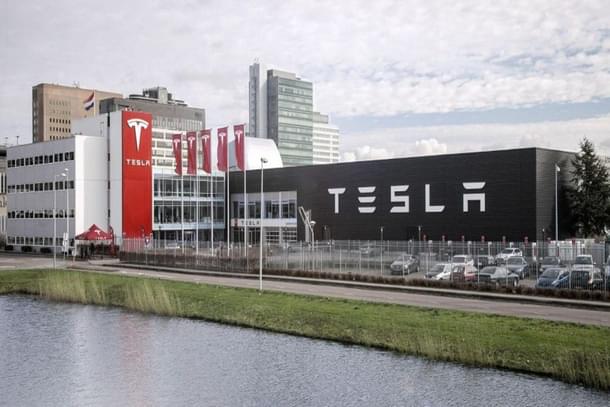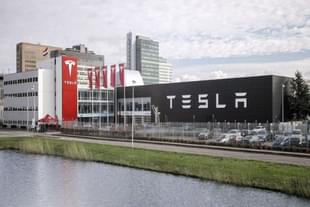Commentary
Explained: What Tesla’s New Home In Malaysia Means For Nickel-Rich Indonesia
Amit Mishra
Aug 08, 2023, 02:44 PM | Updated 02:45 PM IST
Save & read from anywhere!
Bookmark stories for easy access on any device or the Swarajya app.


Indonesia's year-long charm offensive to court investment from billionaire Elon Musk, seems to have hit a road block by the businessman’s decision to house Tesla's Southeast Asian headquarters in Selangor in neighbouring Malaysia.
Since 2022, the US electric-car maker has been scouting out sites to make more Teslas for global roads and as part of this, Indonesian government had been negotiating to strike a deal for production facilities and to facilitate the company's supply chain.
The significance of Tesla's investment becomes evident as President Joko Widodo went to great lengths, during his visit to SpaceX in May 2022, to persuade Musk to consider manufacturing electric vehicles (EVs) or batteries in the country.
Jokowi, as the president is popularly known, said he has even offered Tesla a nickel mining concession and tax breaks to invest in the country, and that he was confident a deal would be finalised.
The move has raised heckles, with Indonesian press taking a dim view of the development, saying Jakarta had been “snubbed”, while the government on its part has provided reassurances that a new regional headquarters in Malaysia does not indicate neglect towards Indonesia by Musk.
To be fair, Tesla’s investment in Malaysia is not in the form of an EV factory, but will include a head office, service centre, an experience centre and a network of fast-charging and regular-charging stations across the country.
The Nickel Conundrum
The southeast Asian archipelago's move to become a key player in the EV supply chain is based on leveraging its vast reserves of nickel to attract foreign investment.
According to the US Geological Survey, Indonesia holds the world's largest nickel reserves with an estimated 21 million tonnes, which roughly accounts for 22 per cent of known global reserves.
However, Indonesia’s nickel-led development strategy could not translate into an attraction for Tesla. Tesla doesn’t use nickel-based batteries any more and has switched to lithium iron phosphate (LFP) battery cells for its standard-range vehicles.
LFP battery cells do not contain nickel or cobalt, which are supply-constrained, expensive, and have a larger environmental impact.
The absence of nickel or cobalt, make them cheaper to make with some estimates putting it as much as 70 per cent lower per kilogram than nickel-rich nickel manganese cobalt (NMC). The cost advantage comes from its chemical composition — Iron and phosphorus are mined at enormous scales across the globe and are widely used in many industries.
The only downside of LFP battery is its low energy density which is 15 to 25 per cent lower than the alternatives such as NMC, which had been used by Tesla and other automakers in electric vehicles.
However, this is beginning to change as newer models are having high energy density, thereby allowing automaker to substituting nickel or cobalt formulations.
While, high-energy-density batteries, which are required for long-range EVs, all use a significant amount of nickel in the cathode of the battery cell. By volume and cost, it accounts for a significant part of an electric vehicle’s battery pack, which in turn is the most costly part of an EV.
The Culprit
Tesla announced plans to switch to LFP battery cells for its standard battery packs in October 2021, over concerns about long-term availability of nickel supply.
One of the things that made Musk switch to LFP batteries was Indonesia’s ban of nickel ore export, which made nickel prices go up.
Since January 2020, the country has completely banned exports of nickel ore, forcing miners to process the ore domestically and thereby add value to its nickel production.
The situation turned so dire that Tesla CEO Elon Musk made a plea for miners to invest in increased production of nickel, and even promised companies a “giant contract for a long period of time,” should they mine the metal sustainably.
ESG Framework
Analysts note that even though Indonesia has been intensively lobbying with a nickel concession offer to Tesla, the offer does not seem convincing enough to invest in the country.
Questions over environmental social governance (ESG) aspects of nickel companies in Indonesia is being seen as one of the key reason behind Tesla's decision.
"There are still many issues that Indonesia has not complied with enough, especially the ESG aspects of its nickel mining sector. From there, maybe Tesla withdrew its intention to build [a manufacturing facility] here,” Andry Satrio Nugroho, a researcher at the Institute for Development of Economics and Finance (IDF) in Jakarta, said.
Indonesia’s nickel business is concentrated in Sulawesi, where Chinese companies dominate the processing of the silvery-white metal. These firms rely on low-cost ore sourced from numerous smaller mines, predominantly owned by Indonesian entities, scattered throughout the rainforest.
There have been reports in recent years detailing the harsh conditions faced by workers in these units, as well as the environmental damage caused by the operations of smelters, which are reliant on fossil fuels.
With a relatively unstable environmental protection framework and regulatory oversight, operation in Indonesia might become a heightened risk for Tesla.
What Lies Ahead
Despite Tesla's snub, the country has a decent success in tapping its nickel reserves to make itself indispensable for the EV industry, which uses the metal extensively.
In just three years, Indonesia has signed more than a dozen deals worth more than $15 billion for battery materials and electric vehicle production with manufacturers including South Korea’s LG and Hyundai, and Taiwan’s Foxconn.
On the other hand, though, Musk’s bullishness is heralding a genuine shift across the EV industry, Tesla cannot just ignore nickel-based battery chemistry.
Musk's goal is to sell 20 million electric vehicles in 2030, more than a 15-fold increase over the 1.3 million vehicles Tesla sold in 2022. For that, it would need to build seven or eight more "gigafactories" — facilities that produce electric car batteries on a large scale — at an average of one every 12 months or so.
This is where nickel-based cells become relevant and Tesla, is already working to augment its supply chain through “secret deals” with suppliers, including Vale.
Additionally, it is being claimed that Tesla had agreed to purchase $5 billion worth of Indonesian nickel produced by China’s Zhejiang Huayou Cobalt and CNGR Advanced Material. However, until mid-2023, an official agreement on Tesla’s investment plans had not yet been announced.
But Jakarta is not out of the running yet and could get a Tesla car factory, if it is able to deliver on the ESG aspects of its nickel mining sector.
Widodo and his team, still have the chance to persuade the world's most valuable automaker to get serious about foraying into the country, also known as, the emerald of the equator.





